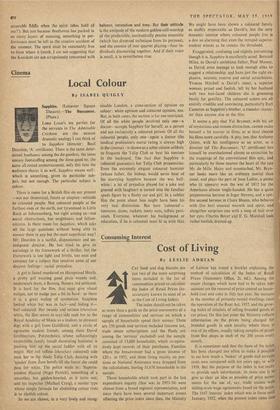Cinema
Local Colour
By ISABEL QUIGLY Sapphire. (Leicester Square Theatre).—The Buccaneer. (Plaza.)
LORD Losses tea parties for the servants in The Admirable Crichton are the nearest
dramatic analogy I can think of
to Sapphire (director : Basil Dearden; 'A' certificate). There is the same deter- mined bonhomie among the do-gooders, the same uneasy footseuffing among the done-good-to; the same all-round embarrassment, only this time the audience shares it as well. Sapphire means well : which is something, given its particular sub- ject, but not enough. The particular subject is colour. nisable London, a cross-section of opinion on colour: white opinion and coloured opinion, too. But, in both cases, the section is far too restricted. Of all the white people involved only one—a doctor—accepts Sapphire for herself, as a person and not exclusively a coloured person. Of all tha coloured people, only one—again a doctor (the medical profession's moral rating is always high in the cinema)—is shown as a sober citizen unlikely to frequent the Tulip Club or beat his tomtom in the backyard. The fact that Sapphire is coloured guarantees her Tulip Club propensities. Even the extremely elegant coloured barrister (whose father, the bishop, would never hear of his marrying Sapphire because she was half- white : a bit of prejudice played for a joke and greeted with laughter) is turned into the familiar spade figure by a flashy car and girl. In a subtler film the point about him might have, been his very real distinction. But here 'coloured'= tomtoms, slums, rackets, zooty suits, taffeta petti- coats. Everyone, whatever his background or education, if he is coloured must fit in with that. There is room for a British film on our present —not our theoretical, future or utopian—attitude to coloured people. Not coloured people at the farthest ends of the earth, nor tyrannised in Little Rock or Johannesburg, but right among us—not social abstractions, but neighbours and fellow- citizens. Is there room for Sapphire, which asks all the large questions without being able to answer them in any but the most superficial way? Mr. Dearden is a tactful, dispassionate and un- indignant director. He has tried to give us sociology in the framework of a thriller, but the framework is too light and brittle, too neat and compact for a subject that involves some of °Ur deepest feelings: racial prejudice.
A girl is found murdered on Hampstead Heath, a pretty girl wearing good plain tweeds and,
underneath them, a flaming, flouncy red petticoat. It is hard for the film, that must give visual nudges, not to nudge just a bit to hard : so there it is, a great wallop of symbolism. Sapphire looked white but was in fact—and hiding it- half-coloured. Her tweedy and serious (therefore white, the film seems to say) side took her to the Royal Academy of Music as a student, to pleasant digs with a girl from Guildford, and a circle of agreeable student friends, among them David (architecture, Polytechnic), whose suffocatingly respectable family (small decorating business) is pushing him up the social ladder with all its might. Her red taffeta (therefore coloured) side took her to the shady Tulip Club, dancing with 'spades' from slum hovels till she learnt she could pass for white. The police wade in: Superin- tendent Hazard (Nigel Patrick), something of a smoothie, but golden-hearted, as it turns out; and his inspeCtor (Michael Craig), a nastier type whose simple formula for abolishing colour riots is to abolish colour.
So we are shown, in a very lively and recog-
We might have been shown a coloured family as stuffily respectable as David's, but the only domestic interior where coloured people live is a den so alarming that even the intrepid superin- tendent winces as he crosses the threshold.
Exaggerated, confusing and slightly patronising though it is, Sapphire is excellently acted. Bernard Miles, as David's ambitious father, Paul Massey, as David, even manage to look enough alike to suggest a relationship, and have just the right ex- plosive, neurotic reserve and social scratchiness. Yvonne Mitchell is David's sister, a superior woman, proud and foolish, left by her husband with two bun-faced children she is grooming busily for gentility. The coloured actors are all entirely credible and convincing, particularly Earl Cameron as Sapphire's brother, a rounder charac- ter than anyone else in the film.
It seems a pity that Yul Brynner, with his air of mysterious and remote distinction, cannot make himself a bit scarcer in films, or at least choose his films more carefully. A pity, too, that Anthony Quinn, with his intelligence as an actor, as a director (of The Buccaneer; 'U' certificate) lets himself be overshadowed almost to extinction by the trappings of the conventional film epic, and particularly by those nearest the heart of the late Mr. de Mille. Hairy and moustached, Mr. Bryn- ner looks more like an ordinary mortal than usual, and plays the part of Jean Lafitte, a pirate who (it appears) won the war of 1812 for the Americans almost single-handed. He has a quite preposterous heroine in Inger Stevens, and a spit- fire second heroine in Claire Bloom, who behaves with (for her) unusual warmth and spirit, and altogether surprises one with a mop of hair over her eyes. Charles Boyer and E. G. Marshall look rather foolish, dressed up.


































 Previous page
Previous page